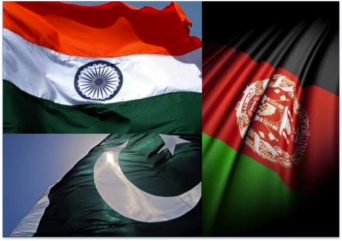- About
- Topics
- Picks
- Audio
- Story
- In-Depth
- Opinion
- News
- Donate
- Signup for our newsletterOur Editors' Best Picks.Send
Read, Debate: Engage.
| located: | India, Pakistan, Afghanistan, France, Germany |
|---|---|
| editor: | Shadi Khan Saif |
This week India, Pakistan and Afghanistan celebrated their respective Independence Day on August 14, 15 and 19 respectively, but these three countries in the South and Central Asian region remain engulfed in bitter conflicts with each other since decades.
India sees Pakistan as its arch rival, Afghanistan has long been frustrated with Pakistan for its alleged interference and cross-border terrorism while Pakistan sees itself caught between its ‘enemies’ Afghanistan and India on western and eastern sides respectively. This enmity lingering on since the end of British rule in the 20th century here has hardened and has become more poisonous over the years.
Thousands of lives have been lost, resources wasted and opportunities for improving the lives of hundreds of millions of people of this region missed because of the rift. Sadly, the ideals of mutual respect, collective benefits and freedom have been marred by ever-strengthening nationalist narrative in these three countries that has been promoted by narrow-minded politicians and military establishment.
The citizens of Afghanistan, India and Pakistan need to thoroughly study the history of revanchism between Germany and France that led to devastating wars, but was later converted into foundation for European integration. The key to success of the historic Élysée Treaty of friendship between France and Germany signed on January 22, 1963 was mutual respect and close consultation between Berlin and Paris on all important issues.
With Islamabad, New Delhi and Kabul sticking to their firm stands on matters related to each other, very little can be achieved towards realizing a dream of Europe-like free travel, trade and above all exchange of culture and ideas.
The historic Grand Trunk Road extended by Sher Shah Suri (1486–22 May 1545), the founder of the Sur Empire in North India, still exists stretching from Western Bengal in India all the way to Kabul, in Afghanistan via Pakistan. But, it is no more used to connect people in these three countries. Distance from Kabul to Islamabad is less than 300 miles, but common men and women in these two neighbour countries feel generations apart. Same goes with New Delhi and Islamabad that share deep-rooted historic and cultural bounds.
Those fearing friendship in the region would harm them should see what the French or German lost from their friendship?
